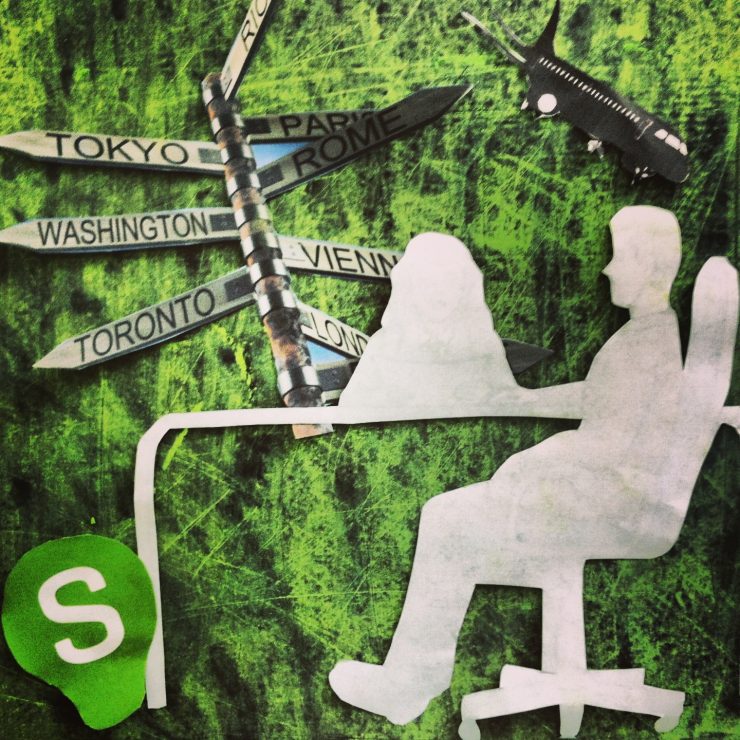Picture this: you’re sitting across the conference table from a potential employee and you’ve got your standard interview questions ready to go. You’ve noticed from their resume that they’ve included some form of experiential travel under their education background. Do you ask them about it? What do you assume about the candidate from their travel experiences? How does it relate to the position you’re trying to fill?
For anyone in the travel or international education industry, these questions aren’t unusual to ask. After all, most positions we’re looking to fill are typically related to meaningful and educational travel. But what about careers where travel experience isn’t necessarily a requirement or qualification? Do you still bring it up as part of the interview process? In short, the answer is, “Yes.”
I am someone who has been on both the receiving and inquiring end of these questions and in my role with GoAbroad.com I’ve become attuned to looking for transferable job skills in every travel experience. With that in mind, here are a few essential things to keep in mind to during the hiring process.
Demonstrations of Personal Growth
 More than anything, the way a candidate talks about their travel experience can reveal a lot about their character. What do they emphasize the most about their time spent studying abroad? What did they find to be the biggest challenge to volunteering? Why did they choose to travel to a particular destination? The anecdotes they share with you will help give a better idea of the person beyond the resume, and the interests that likely led them to your conference table.
More than anything, the way a candidate talks about their travel experience can reveal a lot about their character. What do they emphasize the most about their time spent studying abroad? What did they find to be the biggest challenge to volunteering? Why did they choose to travel to a particular destination? The anecdotes they share with you will help give a better idea of the person beyond the resume, and the interests that likely led them to your conference table.
If a candidate is going to include travel experiences on a resume, there’s a good reason behind it. Pay attention to the amount of detail they give: do they brush over a subject or find realistic, tangible examples to showcase?
HOW they talk about their travel experiences will give you clues to their work style strategic thinking abilities, and personality. Do they focus on how good the food was in Spain, or do they reiterate that trying new foods in a foreign country relates to taking risks as an employee? It’s these simple nuances in phrasing that will demonstrate how much a candidate can turn travel experiences and personal growth into transferable job skills. As an employer, this will definitely stand out to you if you’re aware of it.
What Translates & What Doesn’t
More often than not, I find that most meaningful travel experiences can translate to a career. But not all travel experiences are created equal, and there may be details that don’t translate to the specific job at hand.
Experiential travel by definition refers to “learning from experience” and a candidate’s choice in destination, or type of travel, may not encompass who they presently are or their long-term career goals with your organization. Rather than immediately assume it’s not going to work, it’s better to rely on your questions during the interview to gauge if they’re a good fit for your company.
Another important thing to keep in mind is that while some experiences may not translate, that doesn’t make them less worthwhile. In the same way that quantitative results are important for measuring success, so are the qualitative ones. For example, an individual’s ability to enjoy living in a new country might not immediately come across as noteworthy for all industries. Get the candidate talking about WHY they enjoyed living abroad, though, and the employee worth hiring will find an avenue of translation.
Prioritizing Travel Experiences By Industry
Whether you’re in the travel industry, the engineering industry, or the medical field, you can always make travel experiences a priority during interview process. It’s like we tell students looking to study abroad, but who feel they can’t go abroad because of their major field of study. We remind them that with a flexible attitude, and a bit of persistence, of course they can travel abroad.
It’s no different when it comes to asking about travel during the hiring process. Whatever you might be hiring for, there is so much you can learn about a candidate’s strengths and weaknesses when they’re talking about how they missed an important flight, and had to make the best of it, or got lost in a foreign city where they didn’t speak the language.
Don’t be afraid to broach the subject just because travel experience isn’t on the desired qualifications list. The variety of questions related to travel may vary across industries, but they all have one common denominator: meaningful travel is important and helps mold individuals into informed and global citizens of the world.
As far as initial impressions go, you can’t ask for a more worthy candidate than that.
 Tiffany Harrison first ignited her passion for meaningful travel by living abroad in Scotland, and working in public relations in San Francisco. She now cultivates her skills with GoAbroad.com as the Outreach Manager, is an avid tea-drinker who lives by the words of Jane Austen, and considers her passport a map to discovering the world. Connect with Tiffany on her blog, What Would Jane Do?
Tiffany Harrison first ignited her passion for meaningful travel by living abroad in Scotland, and working in public relations in San Francisco. She now cultivates her skills with GoAbroad.com as the Outreach Manager, is an avid tea-drinker who lives by the words of Jane Austen, and considers her passport a map to discovering the world. Connect with Tiffany on her blog, What Would Jane Do?
SmartRecruiters makes hiring easy.






